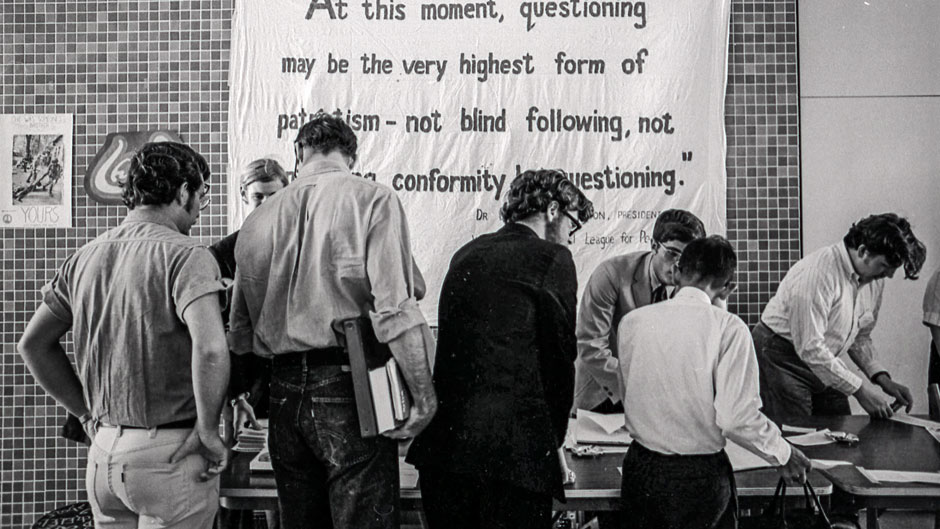This Sunday, Dec. 5, marks the anniversary of the launch of the Montgomery Bus Boycott, regarded by many as the seminal action that sparked the movement to end segregation in the United States.
On that day in 1955, to protest the laws that required them to sit in the back of the bus and yield their seats to white passengers, Black citizens in Montgomery, Alabama, first refused to ride the city buses. For the next 381 days, they committed to walk miles to and from work every day, regardless of the weather.
“The Sixties,” a course first offered in 2002 and biannually since then, will examine the dramatic episodes of the civil rights movement—as well as women’s rights, the struggle to end the war in Vietnam, environmental awareness, and space exploration—as part of the novel curriculum.
“Things have changed, times have changed, and students have changed since the 1960s,” recognized Don Spivey, a Distinguished Professor of History and special advisor to the president on racial justice. Yet as one of three professors for the course, he believes the issues that defined the decade remain vital.
“Watching the news, listening, and seeing what’s happening today, I can’t help but think: Where have I seen this before?” said Spivey, adding that answering the question “What does the ’60s have to teach us?” is a key stimulus for the course.
English professor Patrick McCarthy and sociology professor Marvin Dawkins, together with Spivey, form the teaching team for the course.
McCarthy was a high school student in Birmingham, Alabama, when the 1960s launched. The bus that he rode to his summer job passed in front of the 16th Street Baptist Church that was bombed by white supremacists in 1963, an attack resulting in the deaths of four girls and injuries to 20 others.
“I remember thinking the bombing of a church was the sickest thing I could ever imagine,” McCarthy said.
By the end of the decade, he was in graduate school pursuing his Ph.D. and hoping to avoid being drafted so he could finish the degree, which he managed to do with the assistance of legal aid that substantiated an academic deferment.
McCarthy teaches the literary component of the course. He first participated in 2017 and again plans to share a number of dystopian science fiction novels and films that examine the space race, nuclear war, the emergence of androids, and diminishment of empathy—major concerns of the era.
Spivey highlighted the participation of 45 guest faculty lecturers and panelists who include Jeffrey Duerk, executive vice president for academic affairs and provost; Donna Shalala, former University president and professor emerita; Charles Neu, author of “America’s Lost War—Vietnam: 1945-1975”; and University trustee H.T. Smith, who earned his University law degree after returning from service in Vietnam.
“One of the most powerful things that the ’60s really stood for was the concept of public service—through the Peace Corps, during the Kennedy era, and in many community programs, the sense was strong,” said Spivey, noting that public service will be the focus of Shalala’s lecture.
He noted that the course will offer community engagement opportunities as part of the curriculum, as it has since its inception. Students can satisfy service requirements through volunteer work at a host of participating nonprofit organizations and in lieu of some class assignments.
Spivey highlighted that the course strives to make connections between the ideas and events of the 1960s and contemporary life outside the University. He also emphasized that there are no efforts at political persuasion, either past or present. Opposing points of view are, in fact, encouraged, he said.
“We think that something as complex and multifaceted as ‘The Sixties’ requires a range of personal perspectives and interpretations, for even today the era of the 1960s provokes passionate responses from those who were there as well as those who were not,” Spivey said.
Students may register for “The Sixties” as a course in English (ENG 389), History (HIS 372), or Sociology (SOC 390).

